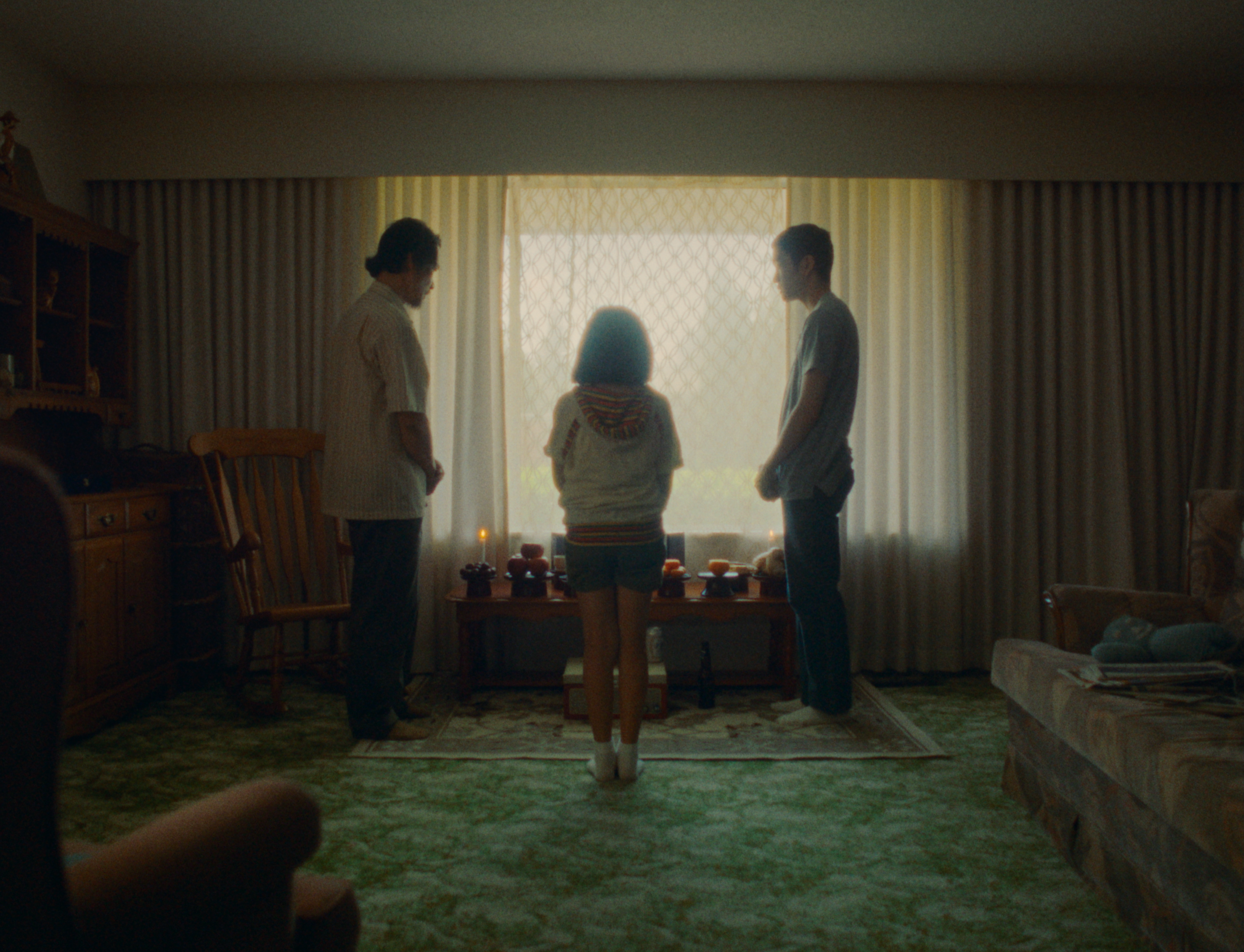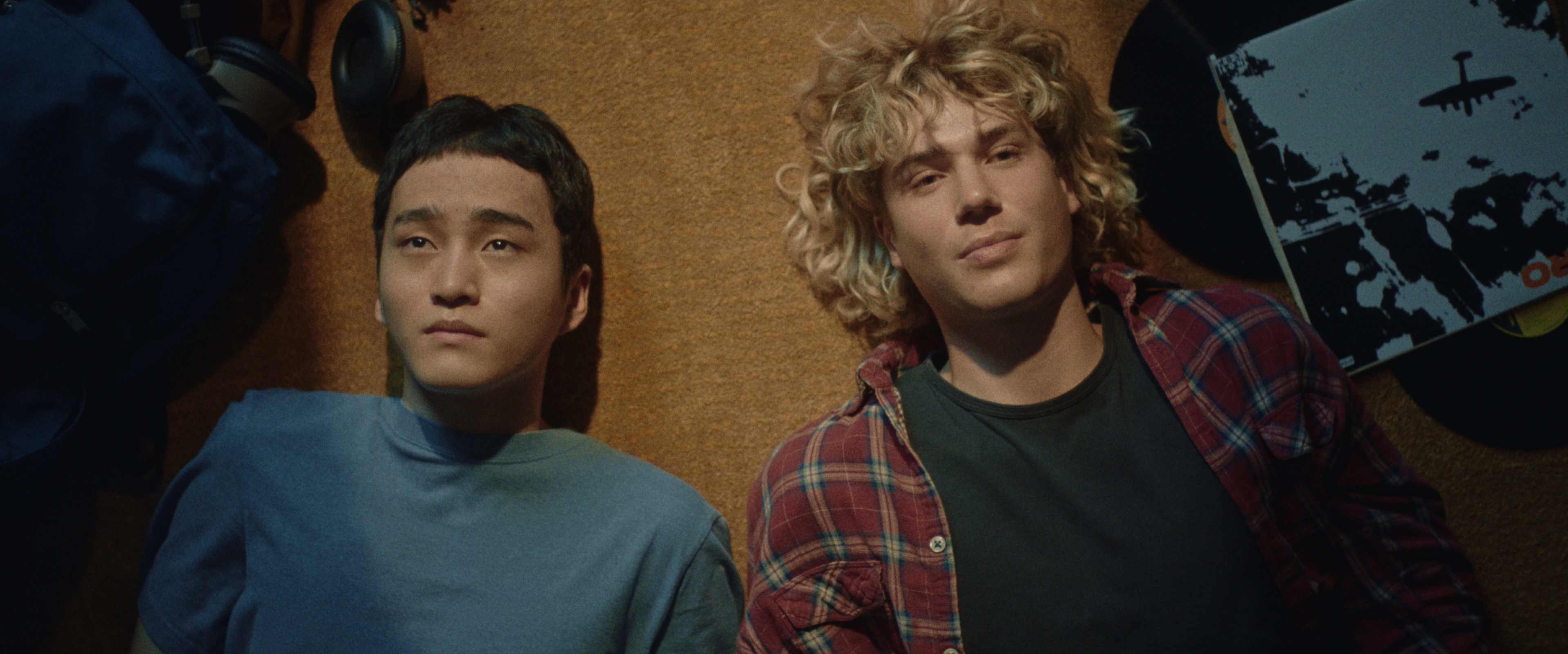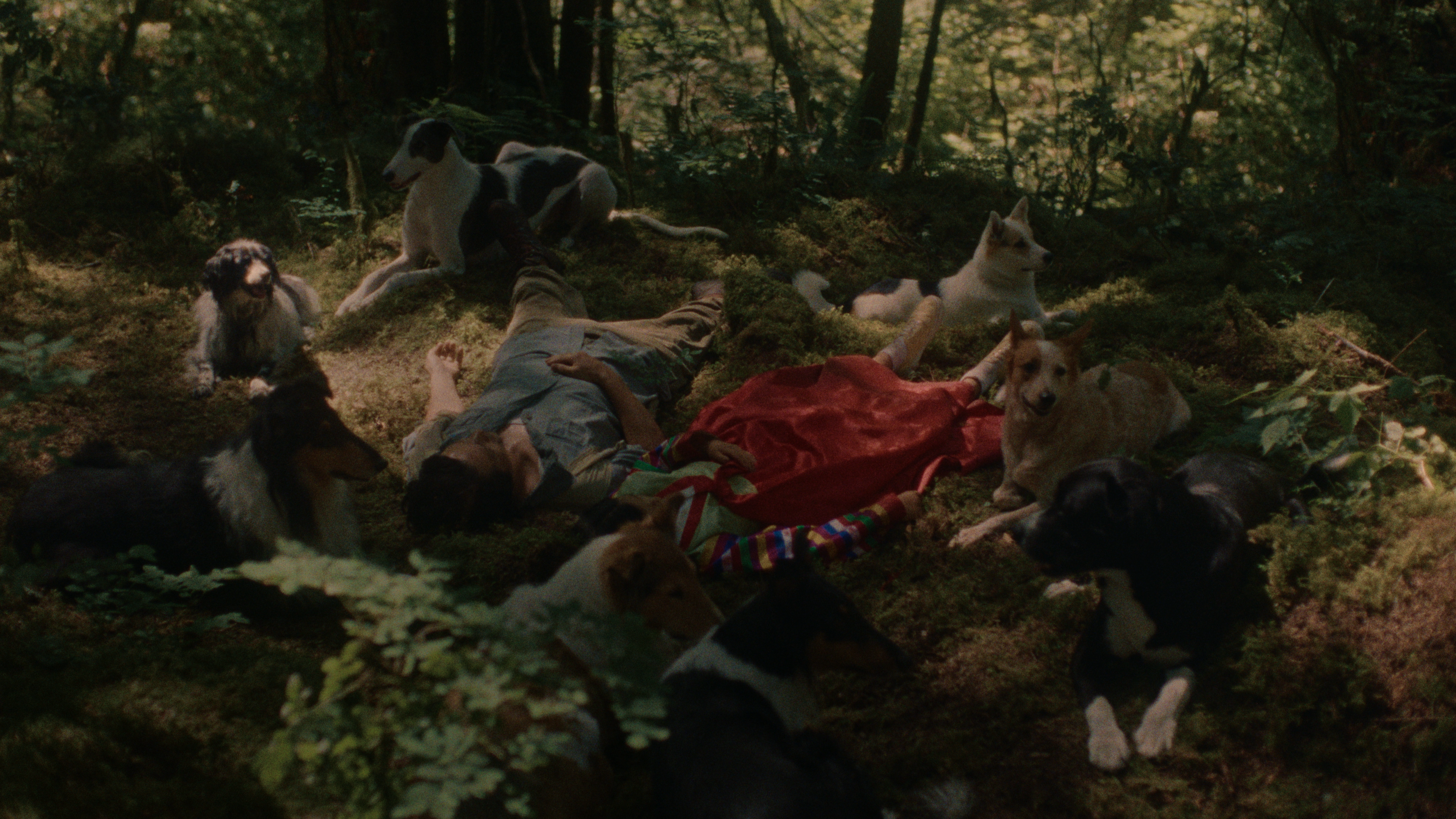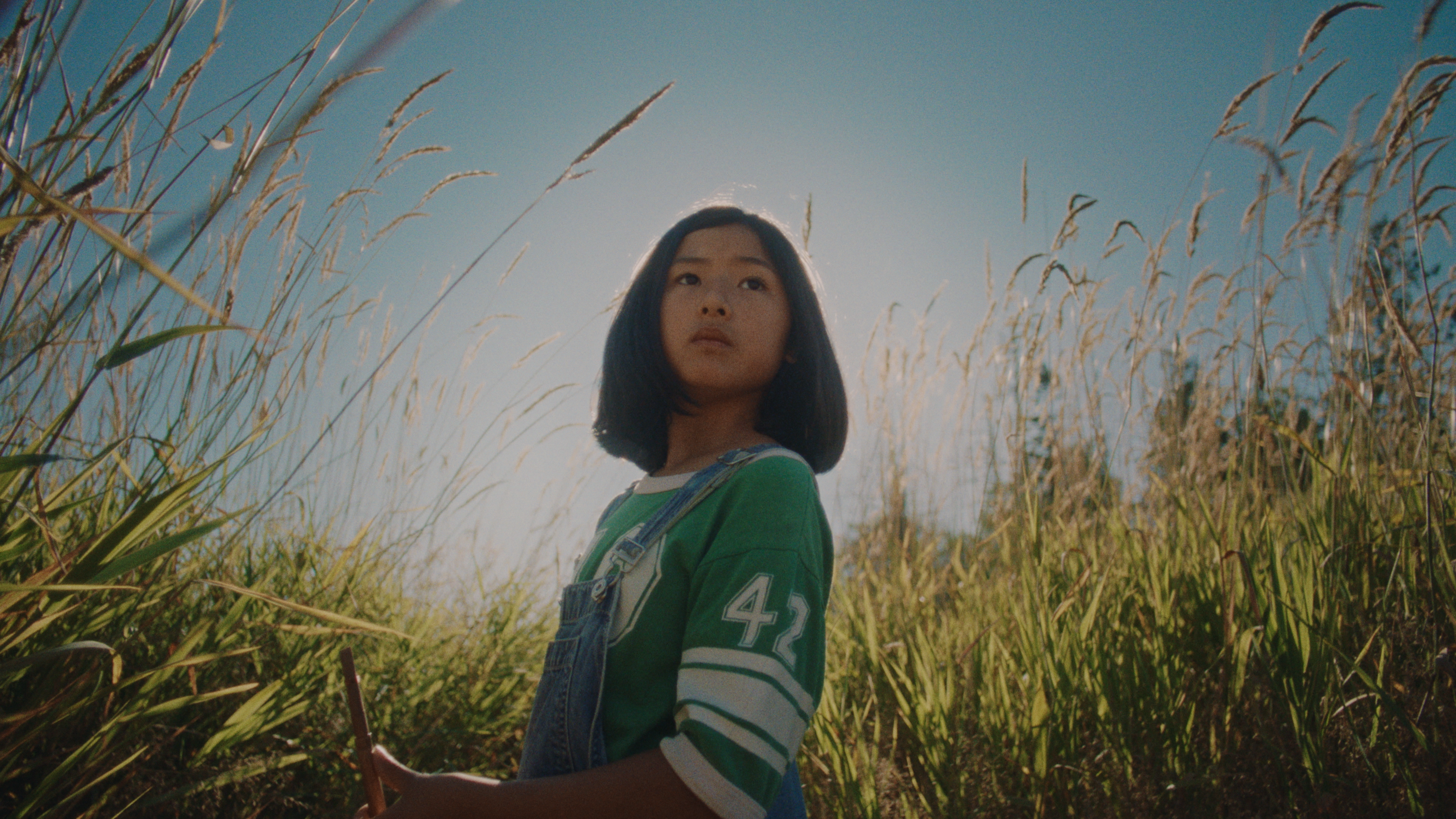MONGRELS as an Exploration of Identity and Belonging | A Conversation with Director Jerome Yoo
Mongrels is the feature film debut from Korean-Canadian director Jerome Yoo, premiering at the 2024 Vancouver International Film Festival. To Yoo, Mongrels “serves as a metaphor for the many complex emotional layers existing within the immigrant experience.” This approach is evident through our conversation and within the film itself.
Mongrels is set in rural Canada in the 1990s and follows a Korean family (a widowed father, his son, and his daughter) as they settle in this new country. Sonny, the father (played by Jae-Hyun Kim) is tasked with “eradicating” the feral canines plaguing the townsfolk. As the narrative progresses, the characters’ personal, emotional, and symbolic connection to these “mongrels” becomes increasingly clear. As the son (played by Da-Nun Nam) so aptly states, “I don’t know where I am sometimes.” Like these dogs without a home, Sonny, Hajoon, and Hana are all lost, each trying to find “home” in their own way.
In my conversation with director Jerome Yoo, he was able to contextualize the film within his own lived experiences, although he noted that Mongrels is likely the “period” on this chapter of his filmic exploration of Korean-Canadian identity. We also chatted about influences, both in the world of film and folktale, and Yoo shed light on some of the aesthetic choices, including the varying aspect ratios and shifts in visual language through a surrealist lens. Enjoy!
Jerome Yoo on His Filmmaking Journey

Adam Manery:
You started out acting before moving behind the camera. What has your journey been like to get here? Has filmmaking always been a part of your life, either in front of or behind the camera?
Jerome Yoo:
I couldn’t have imagined myself behind the camera when I started my artistic journey. I come from sciences—a strict academic background. Like many immigrant families chasing the Canadian dream, my family immigrated when I was one. They wanted a broader, better future for me.
“I knew nothing about filmmaking, only how to work with actors.”
I got into sciences at UBC, majoring in biochemistry. But I felt disconnected from what I was studying; it was a goal I was aimlessly trying to achieve. So I took a break and somehow found myself in theatre. I enjoyed dance classes and found that I fit into theatre well. I loved the intimacy of working with actors in an intimate space.
What was new to me was the idea of vulnerability—being able to show emotions. Growing up, especially in Korean culture, you’re taught to hide your emotions and keep everything in. It was a cathartic experience. I kept going with it, booking roles, getting an agent, auditioning for local shows.
In 2018, I started writing a bit. I befriended some filmmakers and, through creative collaboration, began writing. StoryHive was happening at the time, and I submitted a story inspired by my high school years. It got funded. I wanted my friends to direct it, but they all said no; they couldn’t find their voice in it. Everyone pushed me to direct it, but I had no filmmaking experience—never went to film school. The only experience I had was in front of cameras. I knew nothing about filmmaking, only how to work with actors.
The advice I got was that working with actors was all I really needed to start. I could rely on my department heads—the DP (Director of Photography), the production designer—to bring the technical aspects to life. So I directed my first short film, Gong Ju, in the summer of 2018. I loved the fulfillment of creative collaboration; it was deeper than anything I’d done before. I kept going—did the Crazy8s short film, which is a local competition here. After several shorts, I got the feature film grant through Telefilm in 2020 during the pandemic. So, it’s been in the works for quite a long time.
On His Relationship to Korean Culture

Adam Manery:
And here you are. Gong Ju, which you mentioned, also explores Korean and Canadian culture. Several great Korean-Canadian filmmakers are working right now. One of my personal favorites is Anthony Shim‘s Riceboy Sleeps—a fantastic project. I’m happy you’re adding to this collective Korean-Canadian voice.
Given that you moved from Korea at such a young age, what was your connection to Korean culture then and how has it changed as you’ve gone through life?
Jerome Yoo:
It has definitely grown over the years. Growing up away from my motherland, I didn’t realize at a younger age what it meant to be Korean. English was my first language. I hung around kids of all backgrounds and ethnicities in Canada. I never questioned what it meant to be Korean; the only connection was speaking Korean with my parents and having Korean food.
“The audience we most fear is the Korean audience.”
It wasn’t until middle and high school, when more international Korean students came over, that I became self-conscious about not speaking fluent Korean or being able to read or write it. They tried to communicate with me on MSN in Korean, and I’d write back in English. Those moments sparked a stronger yearning to connect with my motherland.
I’d visit Korea once every four years. In between, I’d have vivid dreams of Korea—how wonderful it is. It’s bizarre going from Canada’s diverse environment to Korea’s homogenous society, where everyone is Korean. Even then, I’d feel like a fish out of water. I’d go to a cafe and ask for a coffee in broken Korean, and they’d judge me because I looked Korean but couldn’t speak fluently.
I felt outcast and developed empathy for international students who were also fish out of water. I didn’t plan for my films to be culturally Korean, but every opportunity led me to comment on something from my upbringing or background. Gong Ju was about someone specific from my high school.
I feel like Mongrels is the last leg of that phase. My previous works centered around Korean culture and the diaspora. Mongrels is kind of the period to this phase of my career.
AM:
There’s something to be said about the universal nature of very specific experiences. Elements of Mongrels are specific to Korean-Canadians or Korean-Americans, but because it’s the story you needed to tell, it becomes universal, which is beautiful.
JY:
I hope so. As a Korean who grew up here, my experience is drastically different from someone who grew up in Korea. Sometimes I wonder what I have to offer in terms of stories or messages. I just try to be honest about my experiences and put them out there.
Perhaps other Koreans who grew up abroad and create films, like Anthony Shim, resonate with the fact that the audience we most fear is the Korean audience. We want our work to be authentic, true, and to resonate with people back home. Sometimes we’ve seen Korean audiences eviscerate movies from abroad.
“There were lots of questions and judgments from my family because they couldn’t quantify what I was doing.”
AM:
I want to dive deeper into Mongrels, but I’m curious—given the academic pressure as a first-generation immigrant and the nervousness about Korean audiences—what does your family think of this journey you’ve embarked on?
JY:
They’re realistic about it. At the end of the day, the big question is: Are you making money? Are you sustaining yourself? I’m 30 now, and many of my peers from UBC have gone into finance or have steady lives. Here I am, still pursuing the arts, juggling part-time jobs.
This was the lengthiest journey for a single project I’ve had. There were lots of questions and judgments from my family because they couldn’t quantify what I was doing. I was working hard but not making returns they could see.
But now, with my film playing at the Vancouver International Film Festival and people talking about it, they’re suddenly proud parents. They have something quantifiable to brag about.
“Oh, my son has made a movie that’s playing at VIFF.”
For them, it’s about money or something they can brag about that’s quantifiable. So right now, I have a bit of a break from their concerns, but we’ll see how long it lasts.
AM:
You’ll have to start pumping out more feature films and income.
JY:
Feature films and income—exactly.
On the Three-Part Structure and Visual Language of Mongrels

Adam Manery:
Mongrels explores the familial immigrant experience. The film is split into three parts, presenting the narrative through the lens of a different family member in each: Sonny, Hajoon, and Hana. We see their interconnected experiences through unique lenses. What led you to this approach of splitting it into three parts? Was that always how it was written?
Jerome Yoo:
From the very beginning, I knew I wanted it to be a three-part chapter film. A lot of the inspiration for that structure comes from Barry Jenkins‘ Moonlight, where we see a single character go through three phases of life. Jenkins articulates so clearly what the character goes through as a child, teenager, and adult. I found that exploration unique and flexible for storytelling and character exploration.
This film is inspired by little sparks of memories from my past that I’ve reflected on. What spoke to me the most were Hana’s journey and Hajoon’s journey. Of course, I haven’t been the adult like Sonny, carrying his kids through this experience. For that, I drew from my parents and what I’ve seen them go through.
Mongrels is fictional—about 95% of it. My dad isn’t an alcoholic raging at his kids. Hana represents the imaginative kid who still believes in magic, which I might have been once. Hajoon’s emotional exploration mirrors some of my own as a teenager.
“The aspect ratios serve each character’s perspective and imply that their worldview is changing—getting wider or more confined.”
I wanted the flexibility to distinctly explore each character’s perspective in set chapters. This way, the audience could focus on that specific lens, rather than a traditional structure that flows more equally or objectively.
AM:
There’s also a clear visual difference between the chapters—the aspect ratios, colour, and the degree of surrealism.
I imagine you had many conversations with your DP, Jaryl Lim. How did you settle on this shifting visual language and the flow between chapters?
JY:
From the beginning, I knew it would be divided and in different aspect ratios. I wanted to invoke certain feelings. For example, Sonny’s chapter is in 4:3 to evoke claustrophobia and suffocation. He has the hardest time because he spent the most time building his life and identity in Korea, making it tougher to adjust in Canada.
The aspect ratios serve each character’s perspective and imply that their worldview is changing—getting wider or more confined. Jaryl was integral in building the visual language, especially in color and camera movement, to serve each character’s intention. He helped me craft a distinct cinematic language that carries us through the film without feeling jarring.
AM:
It definitely translates as a reflection of the characters.
On Using Metaphor and Surrealism While Staying Grounded

Adam Manery:
What’s also interesting is that Mongrels is simultaneously grounded—these characters feel real—but it’s also steeped in symbolism and metaphor. You play with light and shadow, the motif of fruit (specifically the apple), and the “mongrels” themselves.
Could you speak on any of these symbols or the balance between metaphor and staying grounded?
Jerome Yoo:
Absolutely. I love surrealism in my works. While I depict characters in real ways, at times they’re floating in dreams or imagination. I’m inspired by folk tales and mythology, both Western and Eastern.
One inspiration is the Pied Piper of Hamelin. In that story, a stranger in pied clothing comes into a rat-infested town and deals with the rats. Similarly, I wanted to imbue the story with magical surrealism, most evident in the last chapter.
Another tale is the Korean folk story of the King of Darkness. He’s a lonely man in a pitch-black world with no light or company except his two fire dogs—mythical creatures like Cerberus. He asks them to bring light into his world: one to bring the sun, the other the moon. I see Sonny as the King of Darkness—lonely and lost, depending on his children, who represent the sun and the moon.
These layers and nuances aren’t meant to be overt. I don’t expect viewers to immediately recognize these tales. The apple is perhaps the most on-the-nose symbol. We see Hajoon peeling the apple, which reflects his vulnerability and his attempt to understand what it means to be a man while also playing a nurturing role for his sister to protect her innocence from their father.
“[I] want to work with someone to see how amazing—or perhaps traumatizing—it could be. I love working with actors who go deep into character and offer parts of themselves.”
AM:
You strike a balance; it’s not always on the nose. Sometimes it’s abstract but still contributes to the narrative. You’re not just throwing in folktales and metaphors without them serving the narrative.
Quick Questions with Director Jerome Yoo (Inspiration, Films to Watch, and Dream Actors)
Adam Manery:
Before I let you go—a few final questions. You mentioned Moonlight and folk tales. Are there other films or filmmakers that inspired you while making Mongrels?
Jerome Yoo:
Yes. Two filmmakers I deeply respect are Andrea Arnold and Hirokazu Kore-eda. Andrea Arnold’s film Bird is at the festival, and I’m excited to see it. Kore-eda’s Nobody Knows is another inspiration. He’s able to capture incredible moments between family and children in subtle, nuanced, and sometimes incredibly simple ways that are so deep.
AM:
Both are fantastic. Are there any projects you’re looking forward to watching at the Vancouver International Film Festival?
JY:
Yes, I’ll be watching the documentary The Chef & The Daruma. I’ll catch another local BC feature film, Inedia. And I think I’ll watch Sean Baker‘s Anora.
AM:
Last question: As an actor and director, who is your dream actor to have in one of your future projects?
JY:
That’s a good question. It’s one of those things where you want to work with someone to see how amazing—or perhaps traumatizing—it could be. I love working with actors who go deep into character and offer parts of themselves and ideas I could never have dreamed of unless we explored heavily.
An actor who relies on deep study and instinct is Joaquin Phoenix.
AM:
I thought you might be going there.
JY:
But as we’ve heard, he could really challenge someone. However, I was blessed with Mongrels. Bringing it back to the film, the actor who played Sonny, Jae-Hyun Kim, is hands down the best actor I’ve ever had the pleasure of working with as a director. For Mongrels, he was a bit of my Joaquin Phoenix.
AM:
I’m sure there are stories to tell there.
JY:
Amazing ones.
Find More “Points of Review” Interviews Here
Check Out the “Most Anticipated Films of VIFF 2024” Here
About Director Jerome Yoo
Jerome Yoo is a Seoul-born filmmaker based in Vancouver. His films often explore complex themes of cultural identity, existentialism, and youth-hood, blending surreal elements that blur the boundaries between dreams and reality. Growing up in Canada, there is a pulsating undercurrent in his works, conveying a profound longing to reconnect with his motherland.
As part of the next generation of emerging Canadian filmmakers, Jerome’s films have received international recognition. Gong Ju (2018), his first short film, won Best Short Film, Best Direction, Best Screenplay, and Best Actress at the Vancouver Short Film Festival, as well as the Jury Short Prize at the Austin Asian American Film Festival. His second short film, Idols Never Die (2019), was selected by Telefilm’s Not Short on Talent program to be featured at the Festival de Cannes Short Film Corner and was included in the Toronto International Film Festival’s “Summer of Seoul” programme.
Other short works include his viral concept Third Street (2019), which was featured in online fashion-culture magazines such as Hypebeast, Complex, and Elle, as well as River Boy Blues (2020), which was featured on Director’s Notes, and FilmShortage.
Jerome’s directorial debut feature, Mongrels (2024), was one of five films in post-production selected to be highlighted at the Udine Far East Film Festival’s FOCUS ASIA ahead of its anticipated world premiere.



